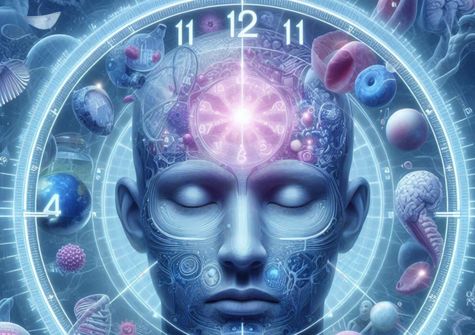
How Circadian Fasting Benefits Women’s Health
When it comes to fasting, timing is everything—literally. Aligning your eating patterns with your body’s circadian rhythm—your internal 24-hour clock—...

Migraine affects approximately 1 in 5 women worldwide, significantly impacting their quality of life. This neurological condition, characterized by intense headaches, is notably more prevalent in women due to hormonal factors. Recently, intermittent fasting (IF) has emerged as a lifestyle intervention with potential benefits for migraine sufferers.
This article aims to explore the connection between IF and migraine outcomes in women, drawing on current research and data.
Migraines are debilitating headaches that affect 18% of women, compared to 6% of men. This discrepancy is largely attributed to hormonal influences, such as fluctuations during menstrual cycles.
Migraine triggers vary but often include stress, specific foods, and environmental factors.
info
Treatment typically involves medication, although many sufferers seek alternative management strategies.
Intermittent fasting encompasses eating patterns that cycle between fasting periods and eating windows. Popular methods include the 16/8 method and the 5:2 diet.
Beyond weight loss, IF has been linked to benefits like hormonal balance and inflammation reduction. For instance, Varady et al. (2013) found that IF can lead to improvements in markers of inflammation and insulin sensitivity.
So, have you heard about this intriguing piece of research published in The European Journal of Neurology, and it’s kind of a big deal. They looked into insulin resistance and metabolic syndrome and their effects on people dealing with migraines. The results? Pretty amazing – combating insulin resistance and metabolic syndrome with an IF regimen reported their migraines became less frequent and less intense.
It’s like finding out that changing when you eat could actually give you more good days!
Let’s talk more about why this might work.
First off, weight loss. Nobody likes being told to lose weight, but hear me out. Being overweight can actually make your migraines worse. With IF, particularly the 16/8 method where you eat during an 8-hour window and fast for 16, folks have managed to shed between 3-8% of their body weight over 3-24 weeks. That’s from a study by Harvie and colleagues in the International Journal of Obesity. Lighter weight means less inflammation, which can mean fewer migraines. It’s all connected!

But wait, there’s more to IF than just dropping a few pounds. Oxidative stress – this imbalance between free radicals and antioxidants in your body – is linked to migraines. IF acts like your body’s personal cleanup crew, reducing that oxidative stress. Plus, it’s like a brain booster, increasing something called BDNF (brain-derived neurotrophic factor) that helps keep brain cells healthy.
note
Now, for the ladies, this next bit is super interesting. We know there’s a link between migraines and hormones, especially estrogen. Fluctuations in estrogen levels can bring on migraines. The direct connection between IF and estrogen levels is still a bit of a mystery, but IF might be helping to keep those levels more stable, making migraines less of a regular guest in your life.
Have you come across those stories where people try something new and it totally changes their game? Well, there’s this piece in Nutrients from 2020 that’s kind of like that for folks dealing with migraines and trying intermittent fasting (IF). It’s not your typical dry research; it’s filled with real stories from real people who’ve seen real changes.
So, what’s the scoop? After jumping on the IF bandwagon, some folks mentioned their migraine days got slashed from eight to about four a month. Imagine cutting your pain days in half just by tweaking when you eat. And it’s not just about fewer migraine days; some were even able to dial back on their meds, which is both a win for their health and their wallets.
But, like any good story, there’s a cautionary note.
warning
IF isn’t a one-size-fits-all solution, and what works wonders for one person might not for another.
Plus, changing up your eating habits can be a big deal, especially for our bodies. So, chatting with a healthcare pro before diving into IF makes all the sense.
Diving into intermittent fasting (IF) can feel like you’re stepping into uncharted territory, especially for women battling migraines. It’s a journey that requires a map, particularly because of how IF might dance with your hormones, potentially affecting menstrual cycles and even fertility. Did you know that studies, like one published in the Journal of Clinical Endocrinology & Metabolism, suggest that significant changes in diet or body weight can influence menstrual regularity? It underscores the importance of a thoughtful approach.
Starting IF shouldn’t be a leap into the deep end. Think of it more like dipping your toes in, slowly increasing fasting periods to see how your body reacts. This isn’t only cautious: it’s smart. Monitoring changes in your cycle or migraine patterns can give you and your healthcare team valuable insights.
In fact, a survey by the American Migraine Foundation highlighted that many women notice a link between their menstrual cycle and migraine patterns. With this knowledge, your doctor can tailor IF interventions, ensuring they’re a good fit for your lifestyle and health goals. Stepping into IF with this level of preparation and support can help safeguard your well-being, making sure the pursuit of migraine relief doesn’t inadvertently disrupt other areas of your health.

Jumping into intermittent fasting (IF) for migraine relief? It’s a solid start, but pairing it with other lifestyle choices might unlock even greater benefits. Picture this: hydrating like it’s your job, because, according to research in the Current Pain and Headache Reports, dehydration can be a migraine trigger for some.
Then, add a sprinkle of regular exercise to the mix. No need to become a gym rat overnight, but consistent, moderate activity could improve your overall well-being and potentially ease migraine severity, as suggested by a study in Cephalalgia. It’s all about creating a symphony of health-focused habits.
But wait, there’s more to this holistic approach. Let’s not forget the power of a good chill-out session for stress management. Whether it’s yoga, meditation, or a quiet walk, finding ways to decompress is crucial. After all, stress is a notorious migraine provocateur.
Combining IF with these mindful practices and lifestyle adjustments forms a multi-layered defense strategy against migraines. It’s like building a fortress, with each healthy habit acting as a wall of protection, offering a better shot at reducing both the frequency and intensity of those pesky migraines.
Intermittent fasting holds promise as a novel approach for managing migraines in women, with emerging research and personal testimonies supporting its potential benefits. However, it’s crucial for individuals to consult with healthcare providers before embarking on IF, particularly those with existing health conditions.
As the scientific community continues to explore the relationship between IF and migraines, a more nuanced understanding will emerge, hopefully leading to more effective and personalized migraine management strategies.
A: Research, including a study published in The European Journal of Neurology, suggests that intermittent fasting can reduce migraine frequency and intensity by addressing insulin resistance and metabolic syndrome, factors known to exacerbate migraines.
A: Women often experience migraines related to hormonal fluctuations. Intermittent fasting has been shown to potentially balance hormones and stabilize estrogen levels, reducing the likelihood of migraines triggered by hormonal changes.
A: Popular methods include the 16/8 method, where you fast for 16 hours and eat during an 8-hour window, and the 5:2 diet, which involves normal eating for 5 days and reduced calorie intake for 2 non-consecutive days. The best method varies by individual, emphasizing the need for a personalized approach.
A: While experiences differ, some individuals report significant improvements in migraine frequency and intensity within a few weeks to months of starting an intermittent fasting regimen. Monitoring symptoms and consulting with healthcare professionals can help tailor the approach.
A: Intermittent fasting may influence menstrual regularity and fertility due to significant dietary and weight changes. It’s important to approach IF cautiously, especially for women with preexisting health conditions, and under the guidance of healthcare providers.
A: Yes, combining intermittent fasting with adequate hydration, regular moderate exercise, and stress management techniques, such as yoga and meditation, can provide a comprehensive approach to migraine management. A healthy diet, sufficient sleep, and avoidance of known triggers are also key components of an effective migraine management strategy.

When it comes to fasting, timing is everything—literally. Aligning your eating patterns with your body’s circadian rhythm—your internal 24-hour clock—...

That first cup of piping hot black tea in the morning is practically a sacred ritual for many of us. The rich, earthy aroma wafting through the kitche...

Intermittent fasting (IF) and autophagy represent a burgeoning interest in nutritional science, particularly among women. IF is not merely a diet but ...

Intermittent fasting (IF) has gained popularity as a method of improving metabolic health and aiding in weight management. Among the most common metho...

The landscape of dietary practices is ever-evolving, with intermittent fasting (IF) emerging as a popular method attributed to numerous health benefit...